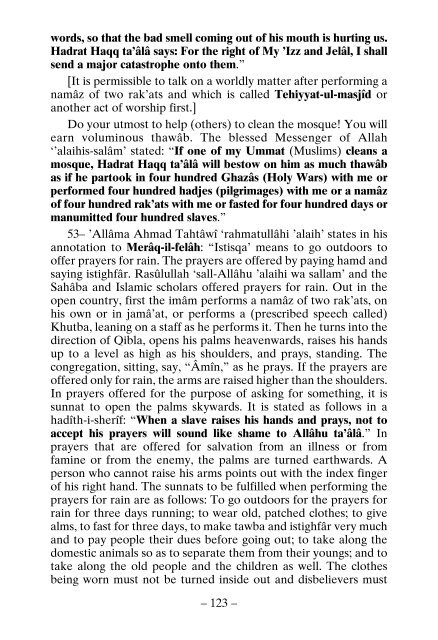O Son !
THE BOOK ‘O SON’ Al-hamdu lillâhi Rabbil ’âlamîn. Wa-s-salâtu wa-s-salâmu ’alâ Rasûlinâ Muhammadin wa Âlihi wa Sahbihi ajma’în. 1– O son! Collecting from books written by the scholars of the Hanafî Madhhab three hundred and sixty hadîth-i-sherîfs and forty-four khabars and also the seven essentials and the five rukns and the seven wâjibs and the fourteen sunnats and the twenty-five mustahabs and the fourteen mufsids of namâz, I have explained them for you. Adapt your acts and deeds to these teachings so that you attain fayz and nejât (salvation)! 2– Also for your information, I have collected a thousand and ninety âdâb (adabs) for you and for other young Muslims like you. If you adapt your actions and acts of worship to these teachings, they will be sufficient for you. If you laze, disobey Allâhu ta’âlâ and cease from these practices and manners, you will be afflicted with slavery and disgrace in the world and subjected to torment in the world to come. If you live up to them and advise your Muslim brothers to do the same, it will be useful for you. They will say blessings over you. And Haqq ta’âlâ will accept their invocations. For, a slave will be pardoned on account of another slave’s invocations for them.
THE BOOK ‘O SON’
Al-hamdu lillâhi Rabbil ’âlamîn. Wa-s-salâtu wa-s-salâmu ’alâ
Rasûlinâ Muhammadin wa Âlihi wa Sahbihi ajma’în.
1– O son! Collecting from books written by the scholars of the
Hanafî Madhhab three hundred and sixty hadîth-i-sherîfs and
forty-four khabars and also the seven essentials and the five rukns
and the seven wâjibs and the fourteen sunnats and the twenty-five
mustahabs and the fourteen mufsids of namâz, I have explained
them for you. Adapt your acts and deeds to these teachings so that
you attain fayz and nejât (salvation)!
2– Also for your information, I have collected a thousand and
ninety âdâb (adabs) for you and for other young Muslims like you.
If you adapt your actions and acts of worship to these teachings,
they will be sufficient for you. If you laze, disobey Allâhu ta’âlâ
and cease from these practices and manners, you will be afflicted
with slavery and disgrace in the world and subjected to torment in
the world to come.
If you live up to them and advise your Muslim brothers to do
the same, it will be useful for you. They will say blessings over you.
And Haqq ta’âlâ will accept their invocations. For, a slave will be
pardoned on account of another slave’s invocations for them.
You also want an ePaper? Increase the reach of your titles
YUMPU automatically turns print PDFs into web optimized ePapers that Google loves.
words, so that the bad smell coming out of his mouth is hurting us.<br />
Hadrat Haqq ta’âlâ says: For the right of My ’Izz and Jelâl, I shall<br />
send a major catastrophe onto them.”<br />
[It is permissible to talk on a worldly matter after performing a<br />
namâz of two rak’ats and which is called Tehiyyat-ul-masjîd or<br />
another act of worship first.]<br />
Do your utmost to help (others) to clean the mosque! You will<br />
earn voluminous thawâb. The blessed Messenger of Allah<br />
‘’alaihis-salâm’ stated: “If one of my Ummat (Muslims) cleans a<br />
mosque, Hadrat Haqq ta’âlâ will bestow on him as much thawâb<br />
as if he partook in four hundred Ghazâs (Holy Wars) with me or<br />
performed four hundred hadjes (pilgrimages) with me or a namâz<br />
of four hundred rak’ats with me or fasted for four hundred days or<br />
manumitted four hundred slaves.”<br />
53– ’Allâma Ahmad Tahtâwî ‘rahmatullâhi ’alaih’ states in his<br />
annotation to Merâq-il-felâh: “Istisqa’ means to go outdoors to<br />
offer prayers for rain. The prayers are offered by paying hamd and<br />
saying istighfâr. Rasûlullah ‘sall-Allâhu ’alaihi wa sallam’ and the<br />
Sahâba and Islamic scholars offered prayers for rain. Out in the<br />
open country, first the imâm performs a namâz of two rak’ats, on<br />
his own or in jamâ’at, or performs a (prescribed speech called)<br />
Khutba, leaning on a staff as he performs it. Then he turns into the<br />
direction of Qibla, opens his palms heavenwards, raises his hands<br />
up to a level as high as his shoulders, and prays, standing. The<br />
congregation, sitting, say, “Âmîn,” as he prays. If the prayers are<br />
offered only for rain, the arms are raised higher than the shoulders.<br />
In prayers offered for the purpose of asking for something, it is<br />
sunnat to open the palms skywards. It is stated as follows in a<br />
hadîth-i-sherîf: “When a slave raises his hands and prays, not to<br />
accept his prayers will sound like shame to Allâhu ta’âlâ.” In<br />
prayers that are offered for salvation from an illness or from<br />
famine or from the enemy, the palms are turned earthwards. A<br />
person who cannot raise his arms points out with the index finger<br />
of his right hand. The sunnats to be fulfilled when performing the<br />
prayers for rain are as follows: To go outdoors for the prayers for<br />
rain for three days running; to wear old, patched clothes; to give<br />
alms, to fast for three days, to make tawba and istighfâr very much<br />
and to pay people their dues before going out; to take along the<br />
domestic animals so as to separate them from their youngs; and to<br />
take along the old people and the children as well. The clothes<br />
being worn must not be turned inside out and disbelievers must<br />
– 123 –

















